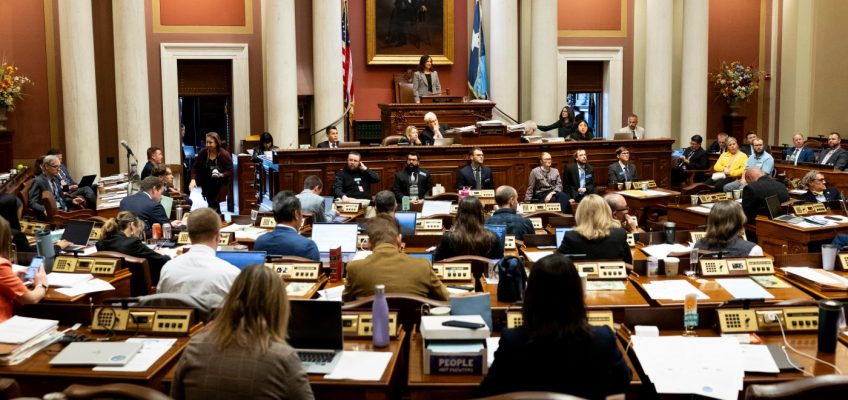With just hours remaining in the regular 2025 legislative session on Monday, Minnesota lawmakers still hadn’t granted final passage to major pieces of the upcoming two-year state budget, including bills on taxes, education and health care spending.
A special session will be required to enact last week’s $66 billion or so budget framework agreement reached by Gov. Tim Walz, the Democratic-Farmer-Labor majority Senate and DFL and Republican leadership the 67-67 tied House.
As of Monday afternoon, only a handful of the 20 or so spending bills that comprise the budget had made it through both the Senate and House and were headed to Walz’s desk to be signed into law.
Around two-thirds of the general fund budget — human health and human services and K-12 education — remain up in the air, and there are still unresolved questions about support for the budget deal.
Walz told reporters Monday afternoon that he wasn’t worried about getting the budget done before the June 30 deadline, and that the biggest pieces often come last. He added he’d call lawmakers back to the Capitol for a special session “when the work’s done” on final bills and that he hopes it will only be for one day.
Gov. Tim Walz.
If the Legislature doesn’t pass a budget by the end of the two-year fiscal period, the state government will shut down. Layoff notices start going out to state workers on June 1. If there is no deal by then. Lawmakers and the governor said they hope to wrap up the budget before the end of May.
What’s the holdup?
Despite leaders calling it a “deal,” it’s only an agreement between top lawmakers and the governor and some of it is still up for intense debate.
Walz, Senate Majority Leader Erin Murphy, House DFL Leader Melissa Hortman, and Republican House Speaker Lisa Demuth, signed off on the deal, but many DFLers are not on board with an proposal to end state-funded MinnesotaCare insurance coverage for adults in the U.S. illegally.
That was a GOP priority in negotiations, and DFL leaders say they agreed to it because they wanted to avert a government shutdown on July 1 — which would interrupt a significant range of services in the state.
Many DFLers say they won’t support the proposal. And they’ve also accused Republicans of trying to make late changes to the deal, like creating more rollbacks for the state paid family and medical leave program.
“Republicans keep moving the goal posts. None of the GOP demands are necessary to pass the state budget bill,” said House Floor Leader Jaime Long, DFL-Minneapolis.
Demuth blamed the late budget bills on a weekslong House DFL boycott at the beginning of session that delayed business as the tied chamber’s power struggle worked its way through court.
“As I’ve talked about from the very start that I believed that we could have gotten this done on time,” she said. “Our Democrat colleagues didn’t show up for work and we ended up doing that. 23 days in a row.”
Special sessions become the norm for passing a budget under divided government. The last time a divided government passed a budget without going into overtime was 2007.
What has passed?
As of 7 p.m. Monday, lawmakers had passed a number of smaller pieces of the budget. One big part of the budget deal that got some pushback was the closure of the aging state prison in Stillwater, though the House and Senate approved that change in a judiciary and public safety budget bill over the weekend.
Besides that, bills on agriculture, veterans affairs, housing and Legacy Amendment funds for outdoors, parks and the arts are also on the way to Walz.
Changes to public employee pensions headed to becoming law as part of a bill passed by the Senate Monday will help insulate state State Patrol and other state public safety pensions against inflation with cost of living adjustments.
What remains?
Most of what makes up the budget hasn’t made it to the finish line. A health bill that carries they deal cut MinnesotaCare benefits for adults in the U.S. illegally has not made it to a vote in either chamber.
A tax bill has not yet materialized, though as part of the budget deal the state plans to raise the tax on cannabis products. Republicans got DFLers to agree to cut the maximum rate for a payroll tax for the new paid family and medical leave program from 1.2% to 1.1%.
Walz’s proposed reduction of the overall state sales tax rate and the creation of a new tax on services like accounting and legal advice did not make it to the final deal. Nor did a Senate DFL proposed first-in-the-nation tax on social media platforms.
A pre-K-12 education budget bill that holds state spending level to inflation for the next two-years still hasn’t made it through. A GOP push to eliminate unemployment for hourly school workers is also headed for the dustbin as a result of the budget deal, DFLers said.
The education budget makes up around one-third of the current $71 billion two-year state budget. Under the deal, education spending will remain level for the next two years other than the required inflation-tied increases.
Higher education, transportation and human services also remain unfinished.
Related Articles
Former state legislator Melisa López Franzen ends campaign for U.S. Senate
MN Legislature sends Stillwater prison closure to governor; key budget pieces remain
Letters: More politicians should follow Walz’s lead on money for religious institutions
MN House passes education budget after unemployment debate delays
Unions oppose plan to close the aging Stillwater state prison


Leave a Reply